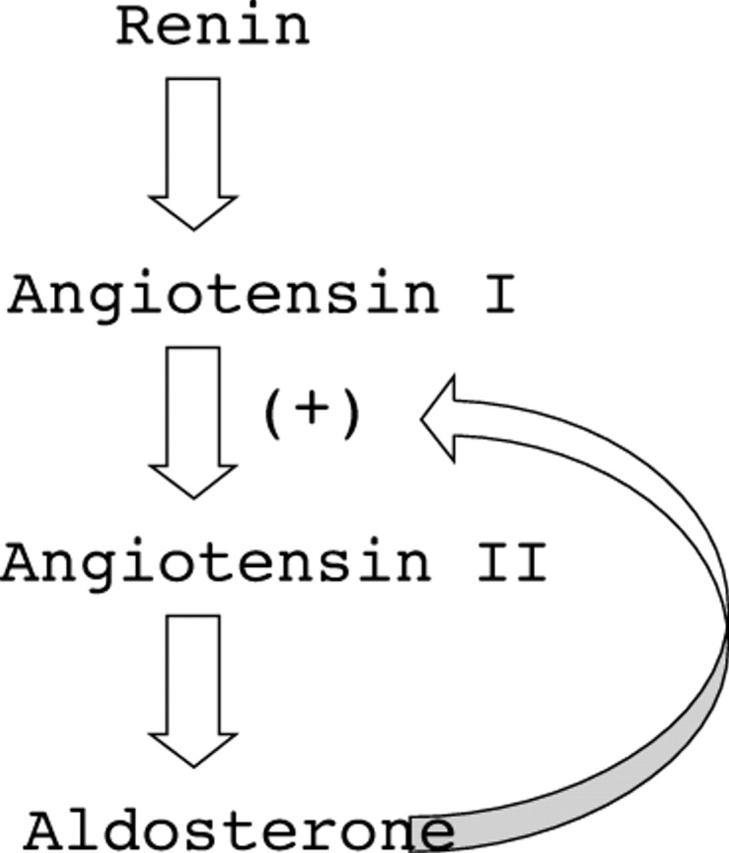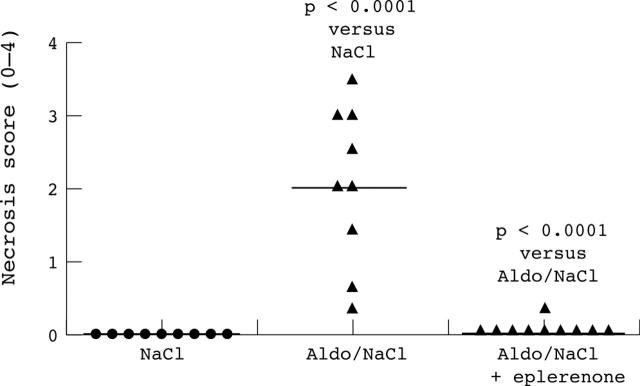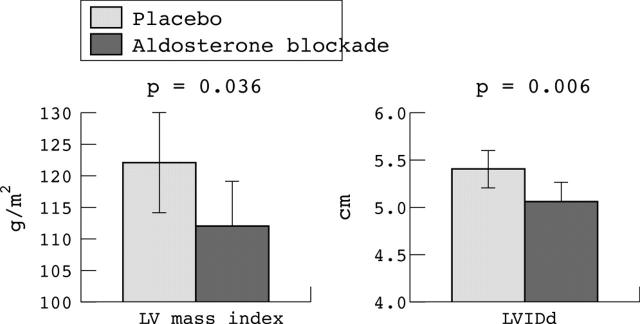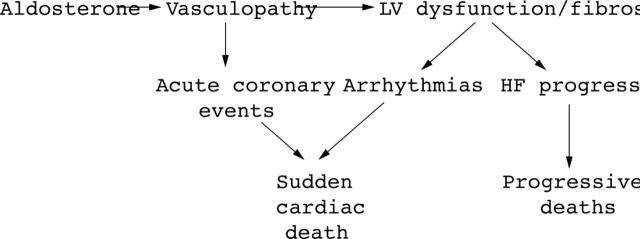Abstract
The structural and functional abnormalities that lead to cardiac death are coronary artery disease and left ventricular abnormalities related to remodelling (left ventricular hypertrophy, left ventricular systolic dysfunction, and left ventricular fibrosis). Aldosterone adversely affects all of these processes. It produces both a vasculopathy and left ventricular dysfunction and fibrosis. Endothelial dysfunction in the coronary arteries can lead to acute coronary events. Left ventricular dysfunction will cause the progression of heart failure, and left ventricular fibrosis and dysfunction provide an arrhythmic substrate. The combination of acute coronary events and arrhythmias can lead to sudden cardiac deaths, while acceleration of the heart failure disease process can lead to deaths from progressive heart failure. The increased understanding of the mechanistic role of aldosterone in cardiovascular disease provides a rationale for the positive results that have been seen in clinical trials of aldosterone blockade.
Full Text
The Full Text of this article is available as a PDF (63.8 KB).
Figure 1.

Aldosterone is thought to amplify production of angiotensin II from angiotensin I and hence aldosterone blockade produces some "extra" ACE inhibition.
Figure 2.
Aldosterone blockade with eplerenone was shown to prevent aldosterone induced myocardial injury. Adapted with permission from Rocha et al.6
Figure 3.
In patients with heart failure, left ventricular mass index and left ventricular internal diastolic diameter were both improved by aldosterone blockade, indicating that treatment can reduce left ventricular remodelling (MacDonald et al2).
Figure 4.
Suggested scheme for the mechanistic role of aldosterone in cardiovascular disease.
Selected References
These references are in PubMed. This may not be the complete list of references from this article.
- Cicoira Mariantonietta, Zanolla Luisa, Rossi Andrea, Golia Giorgio, Franceschini Lorenzo, Brighetti Giovanna, Marino Paolo, Zardini Piero. Long-term, dose-dependent effects of spironolactone on left ventricular function and exercise tolerance in patients with chronic heart failure. J Am Coll Cardiol. 2002 Jul 17;40(2):304–310. doi: 10.1016/s0735-1097(02)01965-4. [DOI] [PubMed] [Google Scholar]
- Farquharson C. A., Struthers A. D. Spironolactone increases nitric oxide bioactivity, improves endothelial vasodilator dysfunction, and suppresses vascular angiotensin I/angiotensin II conversion in patients with chronic heart failure. Circulation. 2000 Feb 15;101(6):594–597. doi: 10.1161/01.cir.101.6.594. [DOI] [PubMed] [Google Scholar]
- Farquharson Colin A. J., Struthers Allan D. Aldosterone induces acute endothelial dysfunction in vivo in humans: evidence for an aldosterone-induced vasculopathy. Clin Sci (Lond) 2002 Oct;103(4):425–431. doi: 10.1042/cs1030425. [DOI] [PubMed] [Google Scholar]
- Harada E., Yoshimura M., Yasue H., Nakagawa O., Nakagawa M., Harada M., Mizuno Y., Nakayama M., Shimasaki Y., Ito T. Aldosterone induces angiotensin-converting-enzyme gene expression in cultured neonatal rat cardiocytes. Circulation. 2001 Jul 10;104(2):137–139. doi: 10.1161/01.cir.104.2.137. [DOI] [PubMed] [Google Scholar]
- Hayashi Masaru, Tsutamoto Takayoshi, Wada Atsuyuki, Tsutsui Takashi, Ishii Chitose, Ohno Keijin, Fujii Masanori, Taniguchi Atsushi, Hamatani Tomokazu, Nozato Yoshitaka. Immediate administration of mineralocorticoid receptor antagonist spironolactone prevents post-infarct left ventricular remodeling associated with suppression of a marker of myocardial collagen synthesis in patients with first anterior acute myocardial infarction. Circulation. 2003 May 5;107(20):2559–2565. doi: 10.1161/01.CIR.0000068340.96506.0F. [DOI] [PubMed] [Google Scholar]
- Heymes C., Garnier A., Fuchs S., Bendall J. K., Nehme J., Ambroisine M. L., Robidel E., Swynghedauw B., Milliez P., Delcayre C. Aldosterone-synthase overexpression in heart: a tool to explore aldosterone's effects. Mol Cell Endocrinol. 2004 Mar 31;217(1-2):213–219. doi: 10.1016/j.mce.2003.10.022. [DOI] [PubMed] [Google Scholar]
- MacFadyen R. J., Barr C. S., Struthers A. D. Aldosterone blockade reduces vascular collagen turnover, improves heart rate variability and reduces early morning rise in heart rate in heart failure patients. Cardiovasc Res. 1997 Jul;35(1):30–34. doi: 10.1016/s0008-6363(97)00091-6. [DOI] [PubMed] [Google Scholar]
- Macdonald J. E., Kennedy N., Struthers A. D. Effects of spironolactone on endothelial function, vascular angiotensin converting enzyme activity, and other prognostic markers in patients with mild heart failure already taking optimal treatment. Heart. 2004 Jul;90(7):765–770. doi: 10.1136/hrt.2003.017368. [DOI] [PMC free article] [PubMed] [Google Scholar]
- Pitt B., Zannad F., Remme W. J., Cody R., Castaigne A., Perez A., Palensky J., Wittes J. The effect of spironolactone on morbidity and mortality in patients with severe heart failure. Randomized Aldactone Evaluation Study Investigators. N Engl J Med. 1999 Sep 2;341(10):709–717. doi: 10.1056/NEJM199909023411001. [DOI] [PubMed] [Google Scholar]
- Pitt Bertram, Remme Willem, Zannad Faiez, Neaton James, Martinez Felipe, Roniker Barbara, Bittman Richard, Hurley Steve, Kleiman Jay, Gatlin Marjorie. Eplerenone, a selective aldosterone blocker, in patients with left ventricular dysfunction after myocardial infarction. N Engl J Med. 2003 Mar 31;348(14):1309–1321. doi: 10.1056/NEJMoa030207. [DOI] [PubMed] [Google Scholar]
- Rajagopalan Sanjay, Duquaine Damon, King Steven, Pitt Bertram, Patel Paresh. Mineralocorticoid receptor antagonism in experimental atherosclerosis. Circulation. 2002 May 7;105(18):2212–2216. doi: 10.1161/01.cir.0000015854.60710.10. [DOI] [PubMed] [Google Scholar]
- Rocha R., Stier C. T., Jr Pathophysiological effects of aldosterone in cardiovascular tissues. Trends Endocrinol Metab. 2001 Sep;12(7):308–314. doi: 10.1016/s1043-2760(01)00432-5. [DOI] [PubMed] [Google Scholar]
- Rocha Ricardo, Rudolph Amy E., Frierdich Gregory E., Nachowiak Denise A., Kekec Beverly K., Blomme Eric A. G., McMahon Ellen G., Delyani John A. Aldosterone induces a vascular inflammatory phenotype in the rat heart. Am J Physiol Heart Circ Physiol. 2002 Nov;283(5):H1802–H1810. doi: 10.1152/ajpheart.01096.2001. [DOI] [PubMed] [Google Scholar]
- Schäfer Andreas, Fraccarollo Daniela, Hildemann Steven K., Tas Piet, Ertl Georg, Bauersachs Johann. Addition of the selective aldosterone receptor antagonist eplerenone to ACE inhibition in heart failure: effect on endothelial dysfunction. Cardiovasc Res. 2003 Jun 1;58(3):655–662. doi: 10.1016/s0008-6363(03)00333-x. [DOI] [PubMed] [Google Scholar]
- Sun Y., Ratajska A., Zhou G., Weber K. T. Angiotensin-converting enzyme and myocardial fibrosis in the rat receiving angiotensin II or aldosterone. J Lab Clin Med. 1993 Oct;122(4):395–403. [PubMed] [Google Scholar]
- Suzuki George, Morita Hideaki, Mishima Takayuki, Sharov Victor G., Todor Anastassia, Tanhehco Elaine J., Rudolph Amy E., McMahon Ellen G., Goldstein Sidney, Sabbah Hani N. Effects of long-term monotherapy with eplerenone, a novel aldosterone blocker, on progression of left ventricular dysfunction and remodeling in dogs with heart failure. Circulation. 2002 Dec 3;106(23):2967–2972. doi: 10.1161/01.cir.0000039104.56479.42. [DOI] [PubMed] [Google Scholar]
- Ullian M. E., Schelling J. R., Linas S. L. Aldosterone enhances angiotensin II receptor binding and inositol phosphate responses. Hypertension. 1992 Jul;20(1):67–73. doi: 10.1161/01.hyp.20.1.67. [DOI] [PubMed] [Google Scholar]





